Puerto Rico after Hurricane Maria: The Public’s Knowledge and Views of Its Impact and the Response
Findings
On September 20th, Hurricane Maria made landfall in Puerto Rico as a category 4 hurricane causing significant damage to much of the island’s basic infrastructure and severely limiting access to electricity, water, and basic necessities. To better understand the public’s awareness of the damage to Puerto Rico and their assessment of the federal government’s response, the Kaiser Family Foundation polled the public on these issues and found a large majority are aware of the severity of the hurricane’s impact on
Poll finds more Americans blame federal government than Puerto Rico for problems restoring electricity, food, etc.
Puerto Rico and most (62 percent) say the people there are not yet getting the help they need. In terms of the federal government’s response, about half feel the federal government is not doing enough to restore electricity and access to food and water (52 percent) and that the response has been too slow (52 percent). The largest share place the blame for problems restoring basic services on a slow response by the federal government (44 percent), followed by 32 percent who place blame on disorganization at the local level and 10 percent who blame lack of coverage by the news media. Given that Hurricane Maria was the third hurricane to hit U.S. ground in one month, the survey also assessed the public’s views of how the response to Maria in Puerto Rico compared to the government’s response to earlier hurricanes and found that 44 percent of the public feel that President Trump and his administration have done less to respond to the damage in Puerto Rico than they did to respond to hurricane damage in parts of Florida and Texas. And, nearly half (46 percent) say that the federal government’s response would be moving faster if Puerto Rico had been a wealthier place with fewer Hispanic people, while a similar share (44 percent) say ethnicity and poverty have not affected the recovery effort. Views of the response vary significantly across Democrats, Republicans and independents.
Knowledge and Awareness of Hurricane Maria’s Impact on Puerto Rico
Large majorities of the public, including Democrats, independents and Republicans, say they have heard ‘a lot’ about the damage Hurricane Maria caused the U.S. Territory of Puerto Rico (73 percent) and say they know the damage to the island was ‘very’ severe (88 percent). The poll was conducted just after President Trump visited Puerto Rico on October 3.
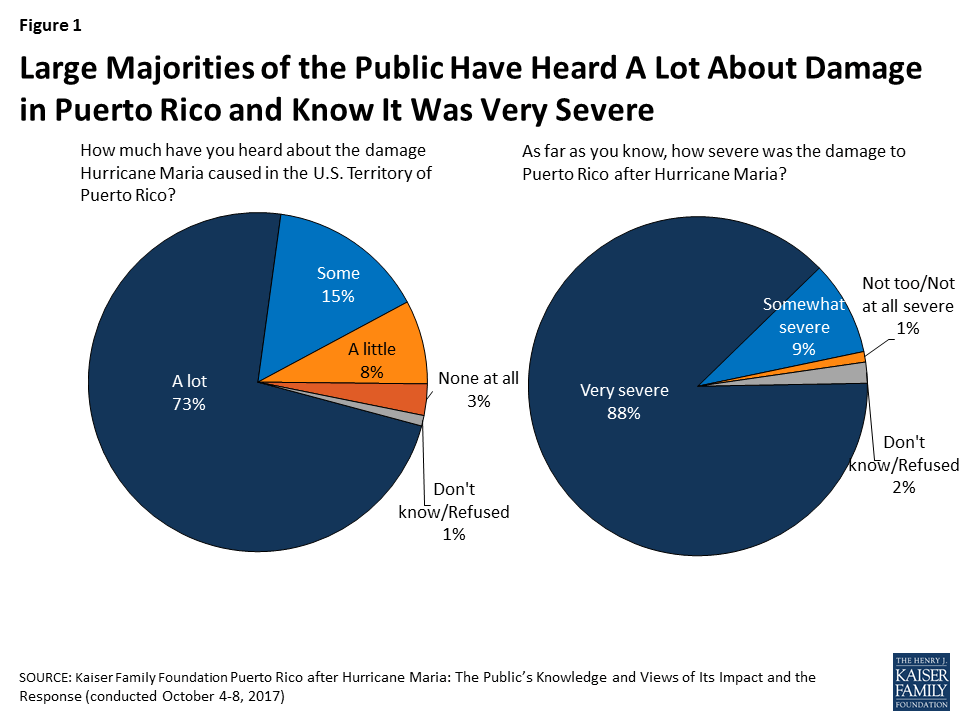
Since the hurricane, there has been some discussion of whether the U.S. public is aware that Puerto Rico is part of the United States. The public largely knows that most residents of Puerto Rico are U.S. citizens (76 percent), including at least seven in ten across parties. This is higher than a recent online poll conducted immediately after the hurricane, which found just over half of the public was aware that people born in Puerto Rico are U.S. citizens.1 This difference may be due, at least in part, to the differences in question wording, poll methodology, and/or timing of the poll.
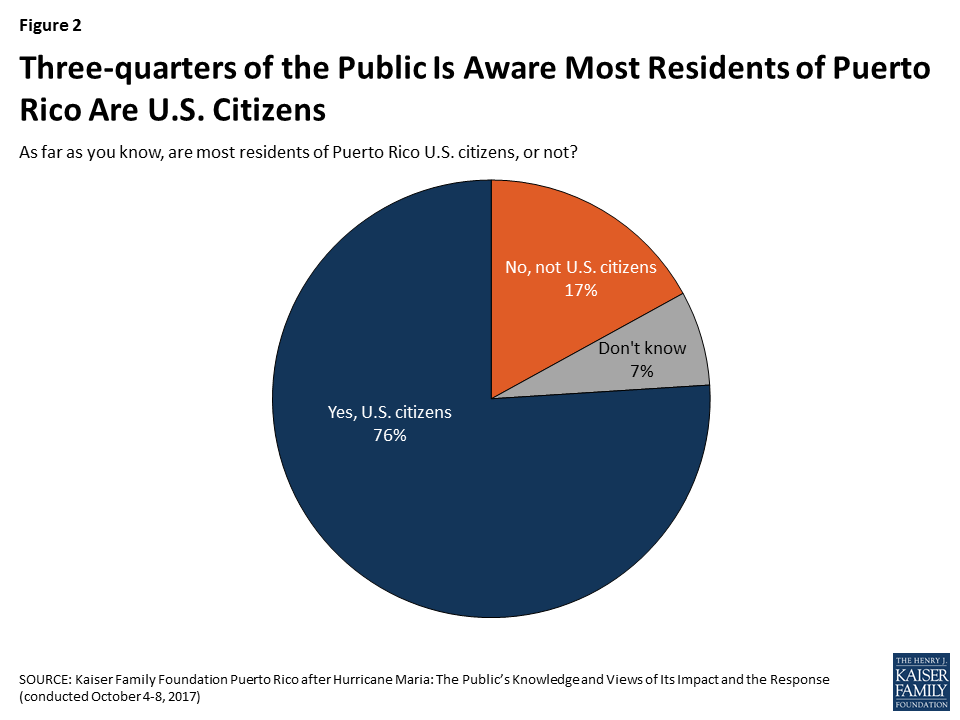
Most of the public (62 percent) says that most people in Puerto Rico affected by Hurricane Maria are not yet getting the help they need, while about a third say they are (32 percent). However, views vary by party with majorities of Democrats (80 percent) and independents (61 percent) saying people are not yet getting the help they need, compared to 56 percent of Republicans who feel they are getting the help they need.

The Public’s Views of the Federal Government’s Response to Damage in Puerto Rico after Hurricane Maria
In the wake of the hurricane and the devastation it caused, some have questioned whether the federal government is doing enough to respond. About half (52 percent) of the public says the federal government is not doing enough to restore electricity and access to food and water in Puerto Rico, while four in ten say the federal government is doing enough. This varies greatly by party. Three-quarters of Democrats (74 percent) say the federal government is not doing enough while the same share of Republicans feel it is (74 percent). A majority of independents say the government is not doing enough (54 percent), compared to 38 percent who say it is. People who feel that most people in Puerto Rico are getting the help they need are much more likely to say that the federal government is doing enough (78 percent), whereas those who feel like most Puerto Ricans are not yet getting what they need are most likely to say the federal government is not doing enough (75 percent).
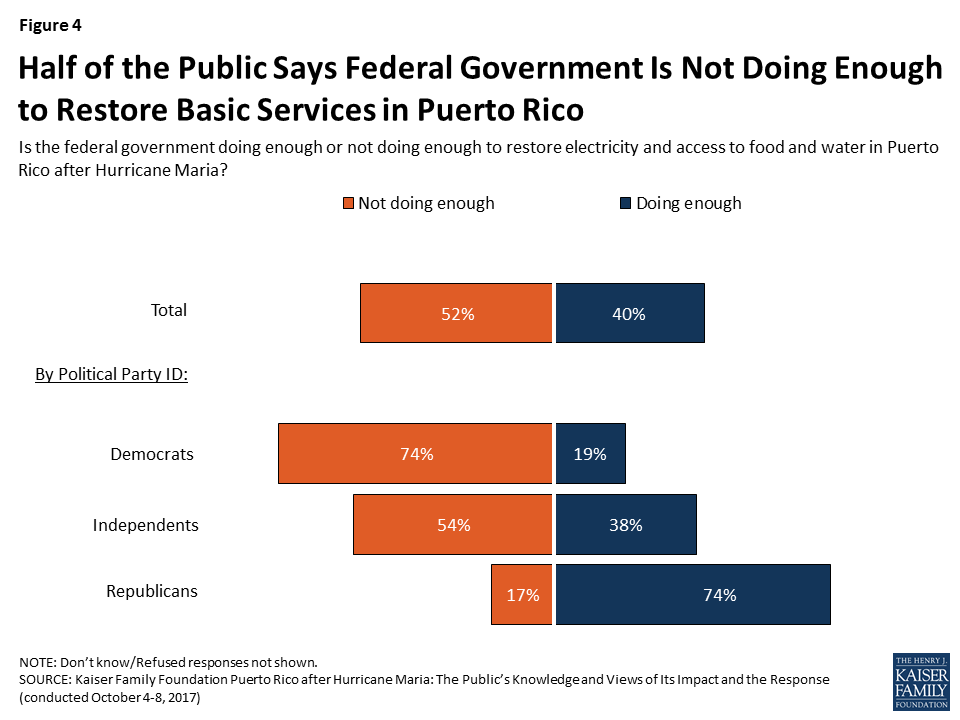
The speed at which the federal government is responding has also been a concern for some, and half of the public (52 percent) feel the federal government’s response to Hurricane Maria in Puerto Rico has been too slow, while 41 percent say it has been about right, and just 3 percent say it has been too fast. Again, responses vary by party with Republicans most likely to say the speed of the government’s response has been about right (75 percent) whereas Democrats, and to a lesser extent independents, say it’s been too slow (72 percent and 55 percent, respectively). In addition, most who say they have heard ‘a lot’ about the damage Puerto Rico say the federal government’s response has been too slow (56 percent), compared to 40 percent of those who say they haven’t heard as much about it.
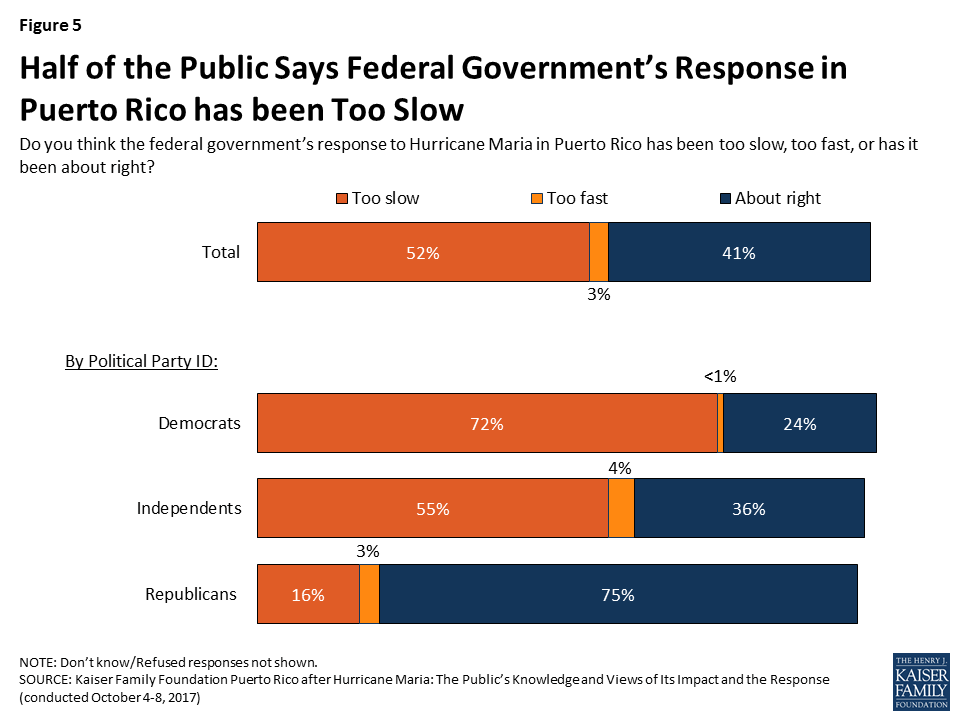
When asked to select who they blame most for the problems restoring basic services in Puerto Rico after Hurricane Maria, more than four in ten (44 percent) say it’s the slow response by the federal government, a third (32 percent) say it’s disorganization in the local Puerto Rican government, and 10 percent say it’s the lack of attention from the news media. Democrats are more likely to say the blame falls to the federal government (64 percent) while the same share of Republicans (64 percent) say disorganization in the local Puerto Rican government is most to blame.
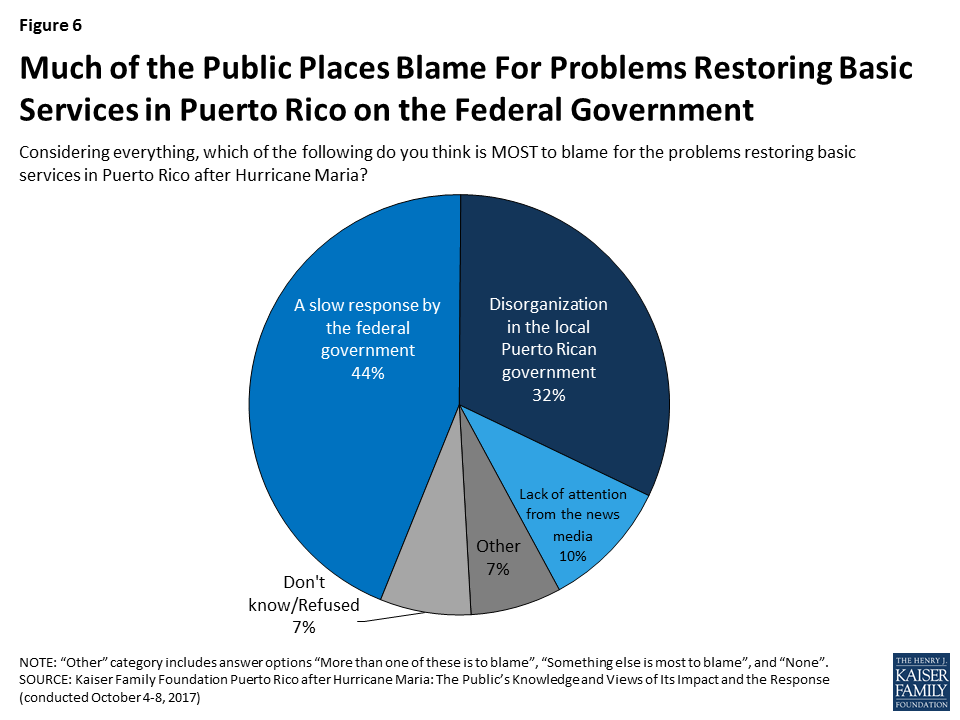
More than four in ten (44 percent) of the public feels that President Trump and his administration have done less to respond to the damage in Puerto Rico than they did to respond to hurricanes that damaged parts of Florida and Texas. An additional 36 percent say President Trump and his administration’s response has been about the same as in Texas and Florida and 16 percent say they have done more to respond in Puerto Rico. Here too attitudes vary by party with most Democrats feeling the response in Puerto Rico has been less than in Florida and Texas (67 percent) and most Republicans feeling it’s been about the same (65 percent).
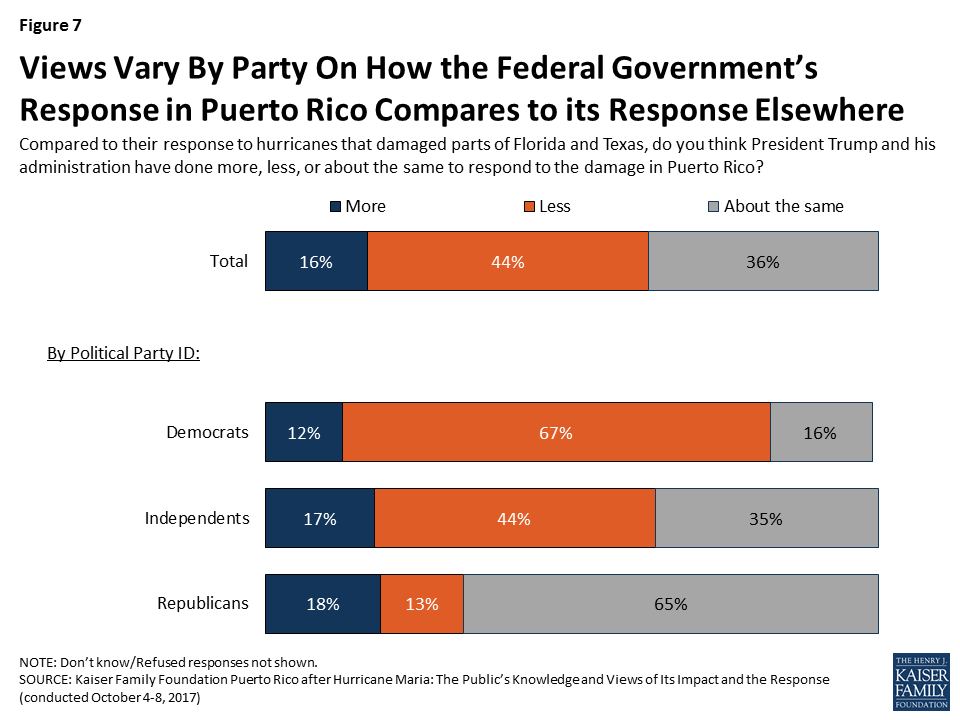
Some have suggested the fact that Puerto Rico has a largely Hispanic population and a high poverty rate has influenced the federal government’s response. The public is divided on whether ethnicity and poverty have played a role: 46 percent say that the federal government’s response would be moving faster if Puerto Rico had been a wealthier place with fewer Hispanic people and a similar share (44 percent) say ethnicity and poverty have not affected the recovery effort. Most Democrats say ethnicity and poverty have affected the recovery effort (69 percent), while Republicans say it haven’t (80 percent) and independents are divided (48 percent say it has and 44 percent say it hasn’t).
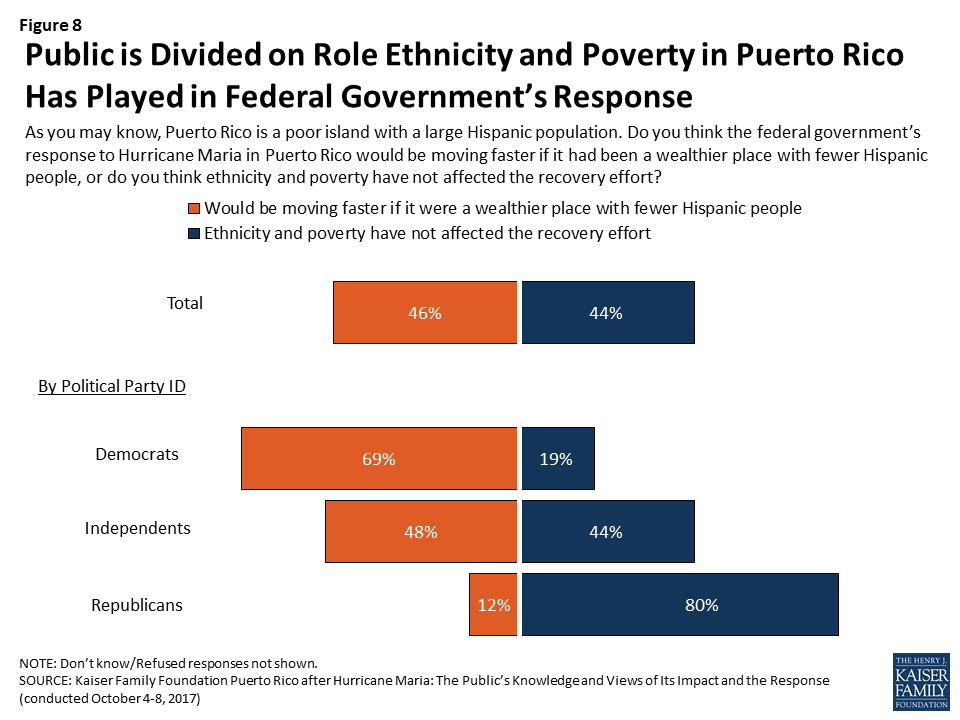
Methodology
To better understand the public’s awareness of the damage to Puerto Rico after Hurricane Maria and their assessment of the federal government’s response, the Kaiser Family Foundation fielded several questions on the SSRS Omnibus Survey. These questions were designed and analyzed by public opinion researchers at the Kaiser Family Foundation (KFF). The SSRS Omnibus survey was conducted October 4-8, 2017, among a nationally representative random digit dial telephone sample of 1,008 adults ages 18 and older, living in the United States, including Alaska and Hawaii (note: persons without a telephone could not be included in the random selection process). Computer-assisted telephone interviews conducted by landline (306) and cell phone (702, including 520 who had no landline telephone) were carried out in English and Spanish by SSRS of Media, PA. Both the random digit dial landline and cell phone samples were provided by Marketing Systems Group (MSG). For the landline sample, respondents were selected by asking for the youngest adult male or female currently at home based on a random rotation. If no one of that gender was available, interviewers asked to speak with the youngest adult of the opposite gender. For the cell phone sample, interviews were conducted with the adult who answered the phone. KFF paid for all costs associated with fielding the questions about Puerto Rico on the SSRS Omnibus Survey.
Different research clients purchase space on the omnibus survey and therefore this topline does not include additional questions that preceded or followed the questions shown here. The survey included four questions about the U.S. economy at the top of the questionnaire, and then questions about the following topics were asked on a random rotation along with the Puerto Rico questions: LGBTQ rights (3 questions), Household products (17 questions), financial security (7 questions), current events (not including hurricanes or Puerto Rico, 9 questions), and Halloween (4 questions).
The combined landline and cell phone sample was weighted to balance the sample demographics to match estimates for the national population using data from the Census Bureau’s 2017 March supplement of the Current Population Survey (CPS) on sex, age, education, race, Hispanic origin, nativity (for Hispanics only), marital status, and region along with data from the 2010 Census on population density. The sample was also weighted to match current patterns of telephone use using data from the July-December 2016 National Health Interview Survey. The weight takes into account the fact that respondents with both a landline and cell phone have a higher probability of selection in the combined sample and also adjusts for the household size for the landline sample. All statistical tests of significance account for the effect of weighting.
The margin of sampling error including the design effect for the full sample is plus or minus 4 percentage points. Numbers of respondents and margins of sampling error for key subgroups are shown in the table below. For results based on other subgroups, the margin of sampling error may be higher. Sample sizes and margins of sampling error for other subgroups are available by request. Note that sampling error is only one of many potential sources of error in this or any other public opinion poll. Kaiser Family Foundation public opinion and survey research is a charter member of the Transparency Initiative of the American Association for Public Opinion Research.
| Group | N (unweighted) | M.O.S.E. |
| Total | 1,008 | ±4 percentage points |
| Party Identification | ||
| Democrats | 306 | ±7 percentage points |
| Republicans | 238 | ±8 percentage points |
| Independents | 406 | ±6 percentage points |
Endnotes
- New York Times, Nearly Half of Americans Don’t Know Puerto Ricans Are Fellow Citizens, Kyle Dropp and Brendan Nyhan, September 26, 2017, https://www.nytimes.com/2017/09/26/upshot/nearly-half-of-americans-dont-know-people-in-puerto-ricoans-are-fellow-citizens.html?_r=0 ↩︎